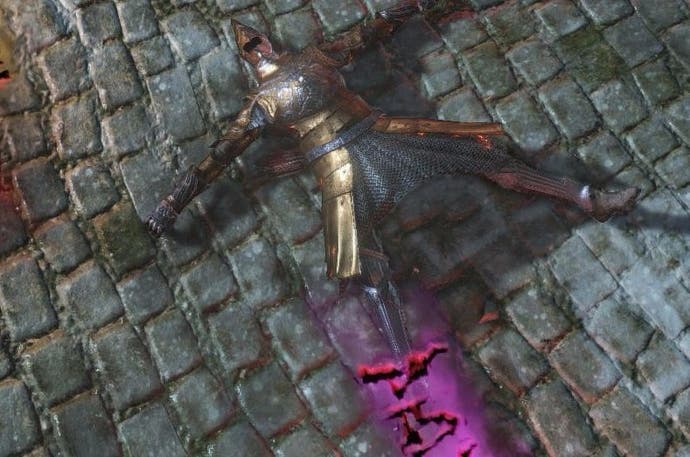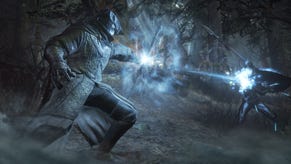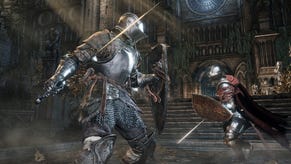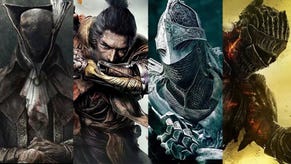Dark Souls 3's multiplayer is a very different, absolutely brilliant take on online
Less mystery, more action.
The concept behind Souls multiplayer is unique among big-budget releases, and so to this day feels fresh. Online multiplayer design over-values symmetry as some sort of foundational principle - which in certain genres, to be sure, it is. But the Souls series thrives on placing a rock-solid combat system in asymmetrical scenarios, bringing players together in unexpected ways and often giving one side a clear advantage. This is the life of an invader, and it's never about fairness.
The very mechanics have an arcane aura to them - one that has been highly-polished over multiple entries, and is less obscure in Dark Souls 3, but still gives cloaks the proceedings in a little mystery. The rules are thus: when your character is a host of embers, an in-game item that increases your health and allows the summoning of phantoms, you can be invaded by other players. When you're not embered up, you can become so by either being summoned and helping with a boss, or by invading another player and killing them.
The thing to note is that Dark Souls is mixing PvE and PvP, which has always been the case but even moreso for Dark Souls 3. The PvE players have the benefit of numbers, and a fixed 'goal' in the level, whereas the PvP players are being framed within that level's context - as a particularly dangerous red phantom, the ultimate Souls midboss. Many permutations arise from different covenants and online items, and the way PvEvP criss-cross each other, but the single most impactful change in Dark Souls 3 is the explosion in player numbers in a single host's world.

I played Dark Souls PvP religiously for years, and during that time it was a one-off to have five players in my world. It could happen, but almost never did. In Dark Souls 3 these kind of player counts are much more common and, as a result, war has changed. You can be part of a PvE gang, roaming the levels with strength-in-numbers that allows brash, audacious play in normally-scary environments. You can be the invader that comes in on this host, flanked by these same bodyguards. You can be the second invader that joins this 3 vs 1 battle at the crucial moment, or the wildcard Darkmoon summoned automatically and turning the tide.
The true slobberknockers, with five or six players, come down to the covenant system. Rosaria's Fingers serves as the red phantom PvP covenant, and are offset by the Blue Sentinels covenant - which counter-invade red phantoms to defend the host, but leave double rewards when killed in the line of duty. The cops-and-robbers theme has always loomed over the red and blues of Dark Souls, but here it works better than ever - not least because of the flickering visual effect on an invader's screen that indicates a Blue Sentinel is entering the world, like a siren's flash.
The Mound Makers have a PvP bent distinct from the above, with their own covenant items and invasion rules that allow them to help or hinder the host - you can help someone get up to the boss fog, unlock all the shortcuts, and then murder them. The Warriors of Sunlight are, yet again and perhaps too predictably, the co-op covenant. On top of this are two area-specific covenants, Farron's Watchdogs and the Aldritch Faithful, the members of which are passively summoned to defend from trespassers. I had no luck with the former but the Aldritch Faithful is tremendous fun, setting you to guard a PvP hotspot jam-packed with all manner of multi-player fights - and plenty of more involved hunting opportunities on the long stretches of roof.

There are other covenants I haven't yet been able to find but, when it comes to the minutiae, this is one of Dark Soul 3's strongest points. In the original game, online was hard to access and the red eye orb depended on doing an extremely tough boss fight out of the game's natural order. The path to a Red Eye Orb in Dark Souls 3, the ubiquitous invasion item, is relatively easy for any player after a certain point - and a white soapstone for summoning can be had cheaply from the first merchant in the game. You don't need to be a member of any covenant to use these two items, and this is where the magic happens - the covenants are great for tailoring your experience in certain ways, and of course earning rewards, but you don't need any fancy badges just to have a good time.
What this means is more phantoms everywhere, of every stripe. PvP can still be one-on-one, but far more often there are other parties involved and unclear alliances - red phantoms can attack each other, though they usually don't for obvious reasons, while purple phantoms can attack both the host and the level's enemies. Certain invaders will be targeted by the level's enemies where others will not. The hostile environment becomes a more tactical layer - invaders have always been able to use NPC enemies against the host, but Dark Souls 3's mobs are much more aggressive and inclined to stick their nose in a fight once triggered. The multi-angled scenarios this creates are exciting, often-unfair, and always interesting.
There will be purists who hate this move towards unpredictable scenarios - the 'honour brigade,' we used to call them back in Dark Souls - and insist that one-on-one duels with no Estus are the only way to play. Well, they can still do that. Dark Souls 3 offers so many ways to play that one-on-one battles are easy to set up with a red soapstone, and I've happened across a few duelling clubs already. But it's also worth saying that this ideal of skill-based gaming is based on a flawed premise, the same one that informs so much symmetrical multiplayer design.
The fallacy is that skill is some fixed measure of a player, a rating, rather than a catch-all term for a confluence of abilities. If you buy this proposition, the duelling mindset goes on to insist that only fights devoid of distraction and extraneous influence (those one-on-one in a 'pure' arena) accurately measure this magical statistic.
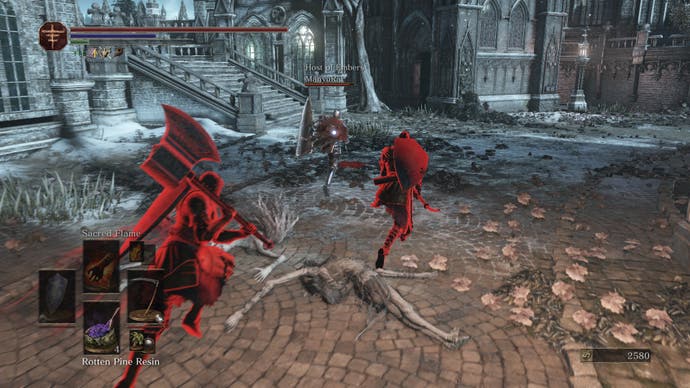
But as any player knows 'skill' is a much more fluid beast, and means different things in different situations. I get by on the melee combat side of things - I'm not the best - but flatter myself that I'm a little craftier than some opponents. I certainly manage to take out a lot of them, and I'm not Dr Reflexes. Working out how to beat someone who's 'better' with a sword than you, by hook or crook, is a challenge of ingenuity. The best kinds of PvP are those where the mind games matter as much as the blades, and in testing your reaction to unfamiliar situations.
The real pleasure in the way Dark Souls 3 opens up PvP into something more like PvEvPvP is how many actors there are around one objective - the host - and the sheer craft, ballsiness and cowardice your fellow humans will bring to the task. Alliances are uncertain, everyone has a strategy, and everyone's eyes are on the prize. Winning in this environment, surely, is what champions are made of.
For me it inflames that competitive spirit. Every time you invade, and lose, the thought is "I'm better than that." Ding ding, round two. And it makes me excited to help, too, knowing there's nothing like the buzz in helping a summoner squeak through against Pontiff Sulyvahn, or standing tall when invaded and seeing their troubles away with a greatsword.
There is something delicious in the way Dark Souls 3 allows you to double-dip - one minute you're an upstanding summon, helping a host who truly needs it. The next you're invading people so terrified they cower in the corner, panic-chug in the middle of enemy mobs, and even disconnect entirely.
The online experience is not always perfect and you do get the odd dodgy connection. I had a fight against Pontiff Sulyvahn where he and the other players just glided around, and I could do damage but wasn't really 'in' the fight. There have been moments of lag, too, and framedrops when a tonne of other players are involved. And who knows how things will settle down after the current bounty of players tapers off.
The technical issues are annoying, but their rarity makes them an insignificant caveat to an online experience of such originality, intensity, and sometimes chaos. In putting asymmetry at the heart of PvP, Dark Souls 3 creates a world where every battle is unique. The ground is always shifting, the faces always changing, but you ride the lightning through it - as hero and villain, trickster and assassin, ganker and honour guard.
To pick-and-choose your playstyle according to mood is a rare offering, and every time you load up Dark Souls 3 the question is there: what kind of role shall I play tonight? It is easy to forget that this is an RPG, and this underlies the unique PvP. In every scenario, you feel the stage is set, and waiting. The players are ready. Time to put on a show.
If you're currently playing the game, you might like to check out our Dark Souls 3 guide.
